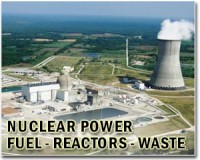 |
Paris (AFP) March 8, 2010 France urged international financial bodies to finance a new era of global nuclear power on Monday and pitched its own reactor technology as the model to follow. Welcoming delegates from 60 energy-hungry nations to a conference in Paris, President Nicolas Sarkozy said civil nuclear power had been unfairly passed over for World Bank development loans. He called on world and regional financial bodies to finance new nuclear projects in developing countries, and announced that France would set up an international institute to promote atomic technology. "I can't understand why nuclear power is ostracised by international finance, it's the stuff of scandal," he said, urging the World Bank, the European Bank for Reconstruction and Development and others to do more. While Paris insists the two-day conference is not a trade show for French reactors, Sarkozy made it clear he expects France to play a leading role in the spread of nuclear technology. In a speech hosted by the Paris-based Organisation for Economic Cooperation and Development, Sarkozy announced a new body to group "France's best teachers and researchers" in nuclear technology. "I have decided to change up a gear by creating an International Institute of Nuclear Energy that will include an international nuclear school," he said. He said the French school would become the heart of an international network of institutes, beginning with a centre in Jordan. "Other centres of nuclear training will be developed with French support, such as the Franco-Chinese nuclear energy institute, in cooperation with Guangzhou University," he said. France has the world's second largest nuclear sector and generates a greater proportion its own electricity through nuclear power than any other economy -- around 75 percent of its needs. It has also made the export of nuclear technology an economic priority. French engineering giants Areva and EDF are promoting the European Pressurised Reactor (EPR), a third-generation reactor design that France considers the most advanced in the world. But the French firms recently lost out on a 20 billion dollar (14 billion euro) contract to supply four reactors to the United Arab Emirates after South Korean firm Kepco came in with a lower offer. "Today, the market only ranks designs on the basis of price," Sarkozy complained, calling on the United Nations' International Atomic Energy Agency to establish a classification system to rate reactor safety. Addressing his guest the new Japanese head of the IAEA, Yukiya Amano, Sarkozy urged the agency "to take responsibility and say, 'These are the various reactors on the market, and here is their safety rating'." The chairman of the European Commission, Jose Manuel Barroso, appeared to be thinking along the same lines. Without going into detail, he announced "a European initiative to raise international safety standards and make them compulsory around the world." The conference came at a sensitive time for nuclear diplomacy. France is leading efforts for fresh UN sanctions against Iran over its nuclear programme, which some powers suspect is aimed at developing an atomic weapon. Iran was not invited to the talks, but another controversial Middle East power, Syria, was represented, alongside 60 more countries including Belarus Brazil, China, Russia, Ukraine and the United States. Syria has been probed by the IAEA on allegations it was building a covert reactor at a site bombed in 2007 by Israel, another guest at the conference. A French official said the conference would respond to widespread "renewed interest in civil nuclear energy" by countries and "the need to accompany them on this route in a responsible manner."
Share This Article With Planet Earth
Related Links Nuclear Power News - Nuclear Science, Nuclear Technology Powering The World in the 21st Century at Energy-Daily.com
 S.Korea's nuclear dreams hinge on new deal with US
S.Korea's nuclear dreams hinge on new deal with USSeoul (AFP) March 7, 2010 South Korea, which has spent decades developing nuclear power to make up for its lack of oil, now hopes to become a global leader in atomic energy as the world turns away from fossil fuels. A Seoul-led consortium, triumphing over more experienced competitors, won a 20.4 billion dollar contract last December to build four nuclear plants in the United Arab Emirates. The deal will make Sout ... read more |
|
| The content herein, unless otherwise known to be public domain, are Copyright 1995-2010 - SpaceDaily. AFP and UPI Wire Stories are copyright Agence France-Presse and United Press International. ESA Portal Reports are copyright European Space Agency. All NASA sourced material is public domain. Additional copyrights may apply in whole or part to other bona fide parties. Advertising does not imply endorsement,agreement or approval of any opinions, statements or information provided by SpaceDaily on any Web page published or hosted by SpaceDaily. Privacy Statement |